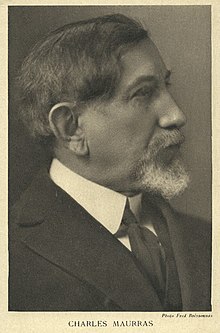Maurrassisme


Maurrassisme is a political doctrine originated by
The doctrine of Maurrassisme
A state of decadence
| This article is part of Conservatism in France |
 |
| Part of a series on |
| Integralism |
|---|
 |
Maurrassisme had as its ambition to be a counter-revolutionary doctrine, affirming the cohesion of
At fault, for Maurras, was the revolutionary and romanic spirit, borne by the liberal forces which he called the four confederated states (États confédérés), defined by him in 1949 in Pour un jeune Français: the
Maurras' solution: order, reason, classicism and liberties
Maurrassisme seems to have been born from a desire for order in the young Charles Maurras, attributed by some to his deafness.[3]
- In philosophy, this desire for order incurred an unconditional attachment to reason.
- In art, the defense of classicism against the "deviant" directions of romanticism.
- In politics, he implied aiming for a regime based on authority. But for Maurras, a regionalist Provençal poet, authority had to accord with the respect for regional liberties – a stipulation which, according to him, could only be found in monarchy. Maurras thus became a royalist on principle in 1896.
More precisely with regard to politics, Maurrasisme rested on the following policies to ensure national cohesion:
- The exclusion from the nation of the four "confederated states", and the exaltation of the national interest ("only France"),
- Putting in place institutions charged with simultaneously guaranteeing the regional freedoms of the "real Nation" and maintaining national unity (for Maurras this institution was the Monarchy).
- In morality, the magisterium of the Catholic Church as a unifying cement, and a creator and model of order.
A political model based on the "Real Country" (pays réel)
In the line of positivism, Maurras considered that societal organisation and institution ought to be the fruit of the selection imposed by the centuries, "organising empiricism" being considered more effective than idealized theories, because of its being adapted to each national situation. Monarchy played a part in these institutions, which were necessary notably to restrain Frankish-French rivalries.
The confidence in institutions forged by time led Maurras to distinguish the "Real Country" (pays réel), rooted in the realities of life — locality, work, trades, the parish and the family — from the "Legal Country" (pays légal) which he cast as artificially imposed on the "Real". These thoughts revisited organicist themes of Catholic political tradition.
Maurras' institutional instinct also owed much to his initial
It may be noted that it was through pragmatism and obsession with civil war that, in 1914 as in 1940, Maurras remained faithful to his principle of nationalist compromise, or the union nationale in time of crisis, and supported both Georges Clemenceau and Philippe Pétain in this.
Place in the history of political ideas
A new political synthesis
In terms of political institutions Maurras had been a
The synthesis between counter-revolutionary ideas and nationalism (but also positivism), triggered by the moral shock of the
Maurrassisisme was to give a second wind to counter-revolutionary ideas, which had been in decline since 1893 which saw Catholics drawn to the Republic. It was to promulgate these ideas beyond their traditionally counter-revolutionary regions, Catholic society and the aristocracy.
Personally an
A major influence on the first half of the 20th century
The Maurrassist synthesis would develop into a school of thought in France, and indeed extend beyond French borders. Within France, Maurrassisme became a major influence in intellectual and student circles (in law and medical departments, etc.) in the 1910s and 1920s, reaching a peak in 1926 before the pope's condemnation. By way of example, the Maurrassist current had its attraction to the most diverse personalities, "from
Maurrassisme was a particular source of inspiration for the .
See also
- Camelots du Roi
- Integral Nationalism
- Maurrassisme in Argentina
- Sorelianism
References
- ^ David Miller, Janet Coleman, William Connolly, Alan Ryan. The Blackwell encyclopaedia of political thought. Second Edition. Malden, Massachusetts, USA; Oxford, England, UK; Carlton, Victoria, Australia: Blackwell Publishing, 1991 Pp. 328.
- ^ See further this extract from his Dictionnaire politique et critique.
- Valeurs Actuelles, link to be provided
- ^ Laurent Dandrieu, Valeurs actuelles, 15 September 2006 Archived 14 November 2008 at the Wayback Machine
Bibliography
- Maurras, la destinée et l'œuvre, La Différence, 1991.
- François Huguenin, A l'école de l'Action française: un siècle de vie intellectuelle, Editions J.-C. Lattès, 1998.
- Yves Chiron, La vie de Maurras, Perrin, 1991.
- Stéphane Giocanti, Maurras félibre, coll. des Amis de la Langue d'oc, 1995.
- Michel Mourre, Charles Maurras, éd. Universitaires, 1958.
- Jacques Paugam, L'Âge d'or du maurrassisme, preface by Jean-Jacques Chevallier, Paris, Denoël, 1971.
- Claude Hauser & Catherine Pomeyrols (eds), L'Action française et l'étranger: usages, réseaux et représentations de la droite nationaliste française, L'Harmattan, 2001, ISBN 2-7475-1778-0
External links
- L'Empirisme organisateur (site of the Restoration nationale movement)

